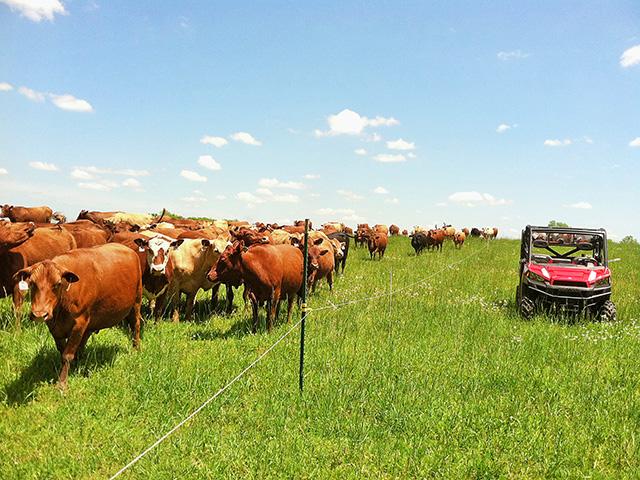Cattle and Carbon Contracts
Opportunity and Risk for Cattle Producers Looking to Add Income From Carbon Sequestration
Carbon credit contracts these days are like snowflakes: No two are alike. That makes "caution" the watchword when entering into one of these agreements, especially for cattle producers.
Tiffany Lashmet, agricultural law specialist at Texas A&M, says she is seeing quite a bit more opportunity for carbon credit contracts on the rangeland side of agriculture today. These contracts are linked to practices like regenerative grazing, or high-intensity/low-frequency grazing programs. Whether these contracts are financially beneficial, however, can vary with whether payments are based on following certain practices or on actual measurements that prove carbon storage.
"All contracts will require extensive records, both historically and moving forward," Lashmet told DTN. "We are seeing contracts that want a five-year history of things like weaning weights, conception percentages, and other data about your operation. From there, the contracts require the data year to year, moving forward. So, there is a record-keeping aspect to selling carbon credits you have to be clear about and comfortable with."
Lashmet explained that while some payments are structured around a producer's use of certain practices, many are measurement based.
"In a measurement-based contract, they will come out and measure your soil, or use modeling, to estimate additional carbon stored," she said. "These contracts aren't just tied to you agreeing to follow a particular practice, they are based on measurements and a dollar per metric ton of carbon stored."
Asked if this means that long-term adopters of regenerative practices could have less to gain financially from carbon credit contracts, Lashmet says that is a definite possibility.
"On a measurement-type contract, early adopters should be concerned about that," she said. "If you've done a good job over the years and sequestered a good amount of carbon, your potential for additional sequestration could be lower than your neighbor's who hasn't followed those practices and has a lot of potential gain."
A NEW AREA OF THE LAW
Lashmet stressed that carbon credit contracts are a relatively new area of the law, making it imperative that they be examined carefully, and if possible, checked by an attorney with experience in this area.
"These contracts are extremely complicated, and all are very different," she noted. "In Texas, for example, if you've seen one oil and gas contract, you've seen them all. It's not that way with these carbon contracts, because they are all written differently. If you don't pay attention or understand all the provisions, there can be a problem.
P[L1] D[0x0] M[300x250] OOP[F] ADUNIT[] T[]
"That fine print is really important. Don't read the first paragraph, then the dollar amount, and be done."
Lashmet said landowners should ask at the outset if companies seeking to enter into these contracts are willing to negotiate. This can save a lot of time. In addition, make sure you:
1. Read the entire contract.
2. Are clear about what agricultural practices are required under the contract.
3. Understand how payments are structured.
4. Know the length of the contract.
5. Understand how the company will verify carbon credits. Check for "no reversal" clauses that could cost you if the amount sequestered becomes lower.
6. Are aware of any limits the contract places on other land uses.
7. Know if you are subject to any penalties if the contract is terminated early.
8. If there is a stacking prohibition. This is a clause that limits your ability to enroll the same land in multiple carbon contracts or even government programs.
9. What data you have to provide the company. Be watchful for clauses that give blanket entry rights, or permissions to fly drones over your entire operation.
10. Are clear on the meaning of clauses related to technical legal issues. Some issues here would include things like assignments, attorney fees, choice of law, venue, dispute resolution, class action waivers, etc.
Ultimately, Lashmet says the key takeaway is you need to be able to make a well-informed assessment as to whether the contract is going to be financially worthwhile.
"Put pencil to paper and determine if the likelihood of payment will be worth the practices you must do under the contract," she said. "It is critical to ensure that the anticipated return exceeds the anticipated costs of switching to one of the qualifying carbon-friendly practices."
For more information specific to cattle producers and carbon credits, these resources, including a White Paper Lashmet worked on with the Kings Ranch Institute, provide a good starting point:
-- Kings Ranch Institute, Should I Sell Carbon Credits? https://issuu.com/…
-- Kings Ranch Institute Webinar on Carbon Credits: https://krirm.tamuk.edu/…
-- Carbon Contracts Podcast with Anson Howard & Todd Janzen: https://aglaw.libsyn.com/…
-- Understanding & Evaluating Carbon Contracts: https://agrilife.org/…
-- Ten Questions to Ask Before Signing a Carbon Credit Contract: https://agrilifetoday.tamu.edu/…
Victoria Myers can be reached at vicki.myers@dtn.com
Follow her on Twitter @myersPF
(c) Copyright 2022 DTN, LLC. All rights reserved.






